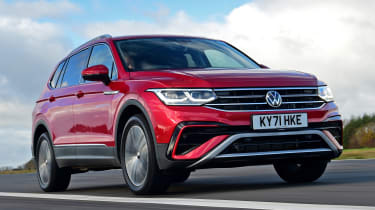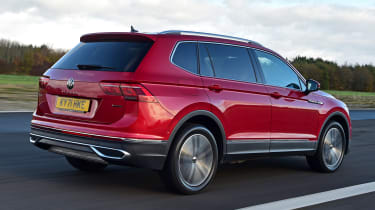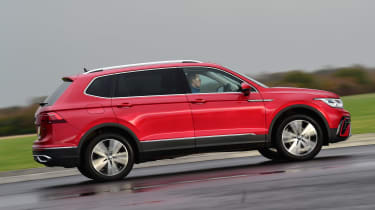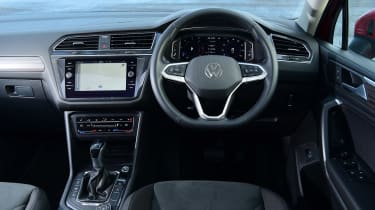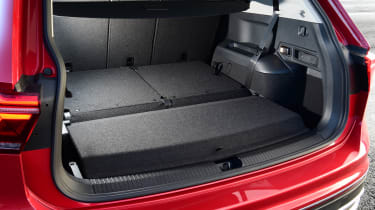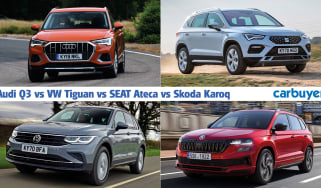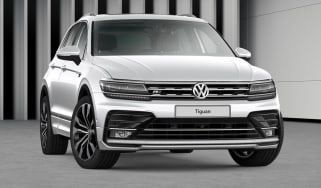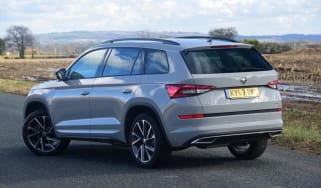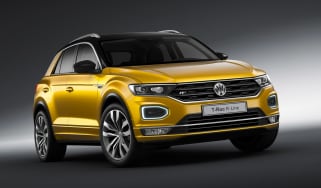Volkswagen Tiguan Allspace SUV review
"If you want your Tiguan with more space, the VW Tiguan Allspace is the answer. It’s not quite as big as a Skoda Kodiaq, however"
Pros
- Good use of space in five-seat form
- Stylish design inside and out
- Decent build quality
Cons
- Expensive compared to rivals
- Not as practical as you’d imagine
- No ISOFIX points for third-row seats
The Volkswagen Tiguan Allspace is a bigger, more practical version of the popular Volkswagen Tiguan SUV. It's a bit longer, with seven seats and a bigger boot, and is a rival to the SEAT Tarraco, Skoda Kodiaq and Land Rover Discovery Sport.
We should be clear on one thing, though – the Allspace isn't billed as a full seven-seater. VW describes the Allspace as offering a "third row of fold-flat occasional seats" and these are really intended to provide extra passenger capacity when needed. If you want a year-round seven seater, you're better off in one of its slightly larger SUV rivals, such as the Kia Sorento, Hyundai Santa Fe or Nissan X-Trail.
 The best 7-seater cars to buy in 2025
The best 7-seater cars to buy in 2025
A facelift in late 2021 introduced styling details to match the standard Tiguan, plus an updated interior with an abundance of the VW Group’s latest technology. The update added an upgraded suite of safety equipment, including the brand’s ‘IQ.Drive Travel Assist’ semi-autonomous driver assistance, that can control the car’s steering, throttle and brakes at speeds of up to 130mph.
You can choose between three trim levels, all of which have a generous list of standard equipment that includes LED headlights, a digital dial cluster, three-zone climate control, parking sensors, alloy wheels, sat nav, DAB radio, and Apple CarPlay and Android Auto. There are Life and Elegance trims, plus the sporty-looking R-Line, with 20-inch alloy wheels and a distinctive body kit. Adaptive cruise control and autonomous emergency braking are fitted to all models as standard too.
Regardless of which model you choose, the Tiguan Allspace offers the same combination of quality materials and great design and build that make the standard version a standout model in its class. It’s far nicer inside than rivals like the Nissan X-Trail and Toyota RAV4 but it’s SEAT Tarraco and Skoda Kodiaq cousins aren’t too far off in the quality stakes, and both are just as comfortable.
More reviews
Engine options for the Tiguan Allspace broadly mirror those of its smaller sibling, with the 2.0-litre TDI diesels likely to be the most popular choices. A 197bhp turbocharged TDI tops the range. As with the standard Tiguan, the best blend of performance and economy comes from the 148bhp 2.0-litre diesel, offering decent acceleration and around 46mpg with front-wheel drive (although four-wheel drive will detract from both). The 237bhp twin-turbocharged BiTDI diesel engine was dropped from the range when the facelifted model arrived, meaning it's now only available as in a used model.
Those looking for a petrol Tiguan Allspace can choose between 1.5 and 2.0-litre TSI engines. Every model has a seven-speed DSG automatic gearbox as standard (a manual gearbox isn’t offered), while VW’s 4MOTION four-wheel-drive system is available with all 2.0-litre engines.
If you like the Tiguan, there's very little not to like about the bigger Allspace. However, other SUVs in the VW Group family are bigger than the Allspace, cost less and are more practical, too – the Skoda Kodiaq and SEAT Tarraco undercut the VW on price and offer more space inside, with quality that’s almost as good.
MPG, running costs & CO2
The Allspace's range of TDI diesels are quite fuel-efficient and all have a DSG automatic gearbox fitted as standard. The entry-level 2.0-litre 148bhp engine is claimed to manage 46.7mpg and 158g/km, or 42.8mpg and 172g/km with four-wheel drive. While neither are cheap for company-car drivers, the latter falls into the highest Benefit-in-Kind (BiK) bracket. These figures are similar in most seven-seat SUVs - the Skoda Kodiaq and Nissan X-Trail almost match it.
If you expect to cover fewer than around 12,000 miles a year, the 1.5-litre TSI petrol may suit you well. Despite its size, it develops just as much power as the diesel above, offering fizzier performance and around 37mpg, plus 173g/km of CO2. Choose the 2.0-litre TSI petrol and four-wheel drive is standard, reducing fuel economy to around 32mpg along with CO2 emissions of 197g/km, placing both towards the top of the BiK bandings for business drivers.
The discontinued BiTDI diesel offered the strongest straightline performance of the lineup, thanks to a twin-turbocharged version of the 2.0-litre TDI engine producing 237bhp. This power figure meant it sacrificed economy in the name of performance, managing around 34mpg.
In fact, as a rule, two-wheel-drive versions of the Tiguan Allspace are more economical and cleaner (in CO2 terms) than the equivalent four-wheel-drive models, so it makes sense to consider your needs before deciding which model suits best.
All Tiguans cost the standard VED (road tax) rate each year after the initial CO2-weighted first-year payment (usually included in the ‘on-the-road’ price). If your Tiguan Allspace’s list price exceeds £40,000 (easily done with VW options lists), you’ll be liable for the additional surcharge on top of this figure the first five times you tax it, increasing your annual payment to over £500 during that period.
Engines, drive & performance
A key ingredient of the standard Tiguan's success is the way it drives, so it follows that the Allspace version should also offer a great experience for the driver. In fact, if you’re used to the standard car, you probably won’t notice much difference.
The Tiguan Allspace is just as competent when it comes to relaxed motorway cruising and the balanced suspension setup and light steering making it easy to place and manoeuvre on smaller roads. Examples fitted with adjustable suspension have different modes to make the ride more comfortable or sporting and you're likely to want to keep it in Comfort mode almost all of the time. This really does improve ride quality, but doesn't sacrifice body control. Sports mode provides a 'sportier' feel, but not necessarily a more enjoyable one.
Without the adjustable suspension, the R-Line trim's stiffer suspension reduces body lean through bends, but does so at the expense of outright comfort. With big alloy wheels fitted as standard, the R-Line has a rather jiggly ride compared to other models in the range.
The facelifted Tiguan Allspace is equipped with a seven-speed DSG automatic gearbox as standard. The petrol lineup starts with a 1.5-litre engine that produces 148bhp. It has front-wheel drive as standard and is capable of brisk enough performance, with 0-62mph in 9.6 seconds. If going as quickly as possible is paramount, then the four-wheel-drive 187bhp 2.0-litre TSI petrol is the fastest model available, with 0-62mph taking 7.7 seconds.
The 2.0-litre TDI diesel is available in 148 or 197bhp outputs. Pick the base 148bhp engine with front-wheel drive and 0-62mph takes 9.6 seconds, with the four-wheel drive version taking 9.7 seconds. Move up to the 197bhp diesel and 4MOTION four-wheel drive is standard; this model manages 0-62mph in 7.8 seconds.
Before the facelift, the now-discontinued 237bhp BiTDI 2.0-litre diesel was the star performer of the range. It managed similar performance to a hot hatch, with 0-62mph in just 6.7 seconds. With plenty of pulling power, this engine is also a great choice for towing and off-roading, and it’s pleasingly quiet too.
Interior & comfort
There’s plenty to like about the Allspace’s interior. It’s basically the same as you’d find inside a standard Tiguan, which is no bad thing – the quality of materials used is great, everything is well made and there’s a sense of solidity that’s absent in some rivals. Spend a bit more money on the SEL trim and you’ll be greeted by an interior that isn’t too far off the Audi Q5 quality, luxury and refinement.
The carried-over dashboard works just as well as it does in the standard Tiguan, with a central infotainment screen mounted high in the centre console that’s very easy to use. VW’s Active Info Display – a digital dial cluster in place of traditional dials behind the steering wheel – is standard on all models and is a joy to behold, displaying everything from speed to sat-nav directions in a clear and convenient manner. DAB radio and Bluetooth connectivity are standard on every Allspace, too.
As part of the facelift in 2021, the Allspace’s physical climate and steering wheel controls have been replaced by touch-sensitive panels. While this works fine for the steering wheel, the main climate touch panel is fiddly to use while driving, with even minor adjustments to the temperature requiring you to take your eyes off the road, unlike the setup in the old car.
Three trim levels are available and all offer plenty of standard equipment. Entry-level Life cars get 17-inch alloy wheels, LED lights and daytime running lights, and front and rear parking sensors. Standard interior features include three-zone climate control, an eight-inch infotainment screen, a digital dial cluster, sat nav, and Apple CarPlay and Android Auto.
The Elegance trim adds a larger 9.2-inch infotainment screen, upgraded IQ.Light LED Matrix headlights, 19-inch alloys, a panoramic sunroof, keyless entry, an electrically operated tailgate, a 30-colour ambient lighting system and a reversing camera. Above this, the flagship R-Line gets sporty exterior styling, 20-inch alloys and an R-Line branded steering wheel. It also features upgraded sat nav with media streaming capability and internet, plus VW’s Driver Assistance pack.
Despite its name, the Allspace is not the biggest car in its class – rivals like the Skoda Kodiaq and are larger and make much better use of their interior space. However, if those cars are too large – or the standard Tiguan too small – then the Allspace makes a good case for itself as something of a happy medium.
R-Line is best avoided if you value comfort over all else, as its stiffer suspension can’t quite keep up with the worst of UK roads and those 20-inch wheels can crash into potholes. The standard suspension setup offers great ride quality, so we recommend you stick with it.
Practicality & boot space
Created first and foremost to appeal to American buyers, the Tiguan Allspace is bigger than the standard car. It’s not as big or well packaged as some other rivals, though – it’s probably better to consider it as a Tiguan with a bit more space than as a genuine rival for the Skoda Kodiaq or similarly sized SUVs.
At 20cm longer than the regular Tiguan, the Allspace uses its extra length to provide an extra 60mm of rear seat legroom, as well as to expand the boot far enough to accomodate a pair of folding occasional seats. With these in use, you're left with 230 litres of boot space - about as much as a typical city car.
These two extra seats are rather tricky to access, and – given their compact size, are best suited to occasional use and the boot is considerably more useful when they're folded out of the way. A feature of the SEL is that the second row of seats can be slid forwards to increase boot space still further – up to 700 litres when fully forward. This is 85 litres more than the regular Tiguan, and if none of the rear seats are in use at all, folding them down liberates 1,775 of luggage space in total.
Official towing figures are likely to be identical to those of the standard Tiguan, ranging from 1,800kg of braked towing capability for the least powerful petrol, all the way up to 2,500kg for the more powerful diesel options. Optional Trailer Assist will even reverse your trailer at a selected angle with no steering input required.
Reliability & safety
The pre-facelift version of the five-seat Tiguan didn’t do as well as you might think in our 2021 Driver Power customer satisfaction survey; it came 62nd out of 75 models. The car's infotainment and equipment were praised, as was its practicality and space, but the engines and suspension didn't score very highly. Volkswagen as a brand fared similarly, finishing 17th out of 29 manufacturers with 15.2% of owners telling us about problems in the first year of ownership.
The standard version of the newest Tiguan gained five stars in its Euro NCAP crash test last year and while the Allspace has yet to be tested in isolation, this is a good indicator of what to expect. It scored an excellent 96% rating for adult occupant protection and 84% for child occupant protection.
Standard safety equipment carried over to the Allspace includes lane-keeping assistance, automatic emergency braking at low speed, plus the usual host of airbags and stability and traction control systems. The Allspace benefits from the same list of safety kit, too, with highlights including adaptive cruise control, and LED headlights with Dynamic Light Assist – technology that allows full beam to be on permanently without dazzling oncoming drivers. This can be bolstered further still by adding VW’s ‘IQ.Drive Travel Assist’ semi-autonomous driver assistance suite. This system operates under supervision from the driver, taking control of the car’s steering, throttle and brakes at speeds of up to 130mph.

